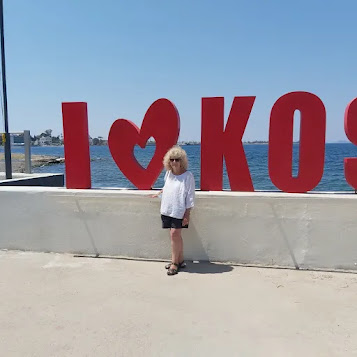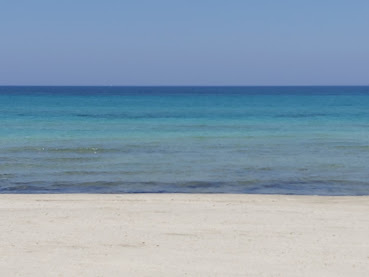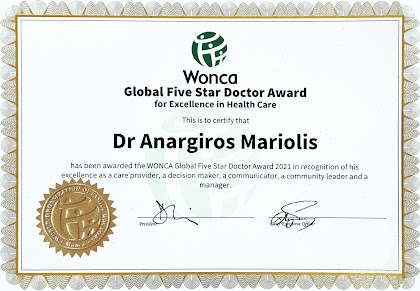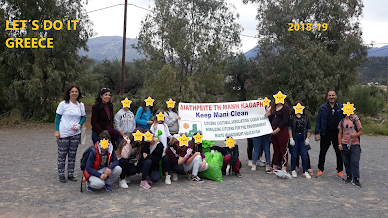That title sums up life in our slice of Greece right now.
Halara under the Almyrikis translates to relaxing under the Tamarisk trees.
 |
| Almyriki on Pantazi Beach, Mani |
Halara, or xalara, (ha - laa - RRRAAH) the newest word in my slowly increasing Greek vocabulary, might just be one of my new favorite words as it so perfectly describes the state of mind one must be in to survive summer in Greece.
 |
| Almyriki shade on Pantazi Beach |
Almyriki, or Tamarisk, trees are unofficial symbols of summer in Greece as many beaches are still lined with these gentle giants sporting wispy green feathers of foliage. Beachgoers vie for coveted spots underrneath them.
 |
| Our Stone House on the Hill in the Greek Mani |
For those who are new to this blog, we are Americans from the Pacific Northwest who left that life behind for an expat adventure in Greece's rural Peloponnese. Summers here remind us of summers in the arid and irrigated regions central Washington State where we grew up. In fact, as I write this, Greece is under an 'excessive heat advisory' just as is Washington. But Greece is actually several degrees cooler right now.
 |
| Almyriki tree in the village |
Today after a sweat-inducing hour or so of watering our plants we headed out to accomplish the simplest of tasks in the village and found ourselves in need of both coffee and halara before we got home. It was while we were sipping cappuccinos at a table under an Almyriki tree, running our flip-flop-clad feet in the sand that I finally understood how perfect the word halara is for life in Greece.
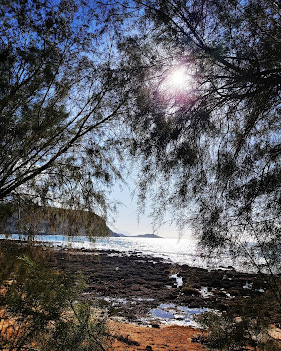 |
| A few almyriki line the road to the village |
A waiter friend who has been advising me on everyday Greek words, offered the word a few days ago when I had told him to 'take it easy' or 'not work too hard'. He gave me a sly smile and said, "Your new word is 'halara', to relax.". For those who like to double check the things that I write, if you look this one up, it will tell you it means 'loose'. If you look up the slang, it will tell you to 'hang loose', 'relax' or 'take it easy'.
Bits and Bobs
While kicked back under that tree I thought of a few things I've not told you about in recent posts so as our British friends say, here are some bits and bobs of travel news:
 |
| Stoupa Beach awash in sunbeds |
* The Greek tourism folks have projected more than one million visitors will be arriving the first week of August. The most popular destinations are Athens, Thessaloniki, the south Aegean islands, Cyclades, Crete and Corfu. (From the looks of our crowded restaurants and beaches, I'd say our Mani is also drawing a lot of them this way!)
 |
| A trip to Greece for medical tourism someday? |
* Greece's Health Tourism Council is working in partnership with Athens International Airport to develop a medical tourism package. (They must have read my post about our
health care in the Mani and our recent colonoscopy experience!)
 |
| Under construction in March, the W Hotel opens in August |
*W Hotel is the newest in the Marriott Bonvoy group to come to Greece. It opens in mid-August at our plush Costa Navarino resort on the 'finger' to our west, about an hour and a half from us. With room prices in the 650-euro range, we won't be staying there until some very low season rate tempts us.
 |
| Award-winning Athens Airport |
*A headline appearing in social media yesterday shouted the news that "Athens Airport Named the Best in Europe" however if one reads the whole article, you learn it is the best in Europe to be in if your flight is delayed. And a lot of them are right now. While I can't say any airport is great when it comes to flight delays, I do have to sing the praises of our Athens' airport: modern shops, restaurants, bars and cafes, baggage storage, museum and archaeological displays not to mention cultural shows every so often to entertain travelers.
Can You Go Home Again?
That flight delay headline was a good segue into a question a few of us from the States are asking ourselves this summer. There is nothing philosophical or political about the question, it is a matter of logistics.
 |
| May not take this many bags back to the US in August |
The chaos occurring in airports throughout Europe and being reported in mainstream and social media is very real. London's Heathrow capped the number of passengers to whom airlines can sell tickets through Sept. 11 in an attempt to get control of its spiraling out of control situation. KLM banned checked baggage for all connections through Amsterdam's Schiphol airport. Malaysian Airlines has banned checked baggage on flights coming to several European airports. Lufthansa, the German airline, cancelled more than 1,000 flights on July 27 as result of a one-day strike by employees.
 |
| The Road Home in Washington State |
The Scout and I have now booked tickets to Seattle, cancelled the trip, and rebooked other flights as has another expat friend; all of us hoping to get back to Washington State. We continue to monitor our reservations to make sure segments haven't been cancelled without notification (yes, that does happen these days).
There is always the chance they will be cancelled at the airport so we find ourselves in limbo as to making hotel reservations for the overnight we will have in London enroute to Seattle, we hesitate to make legal and medical appointments that are on our 'to do' list back in the States.
 |
| That '71 is the graduation year - not our ages, . . .yet! |
For those wondering why we are traveling with such chaos and uncertainty in travel, when we are retired and could travel at any time, it is because I have a high school reunion to attend back in my hometown. A Big One. One that was postponed from last year, thanks to Covid. And I am the reunion co-chair. I need to be there. . .simple as that!
The good news is that we are allowed to go back to our home country while in the residency permit renewal process in Greece. . .and that is good news because we still don't have renewed residency permits and are doubtful we will have them before we leave.
Halara
 |
| Under the Almyriki trees |
So, for now we will stay sittin' and sippin' under the Almyriki tree, enjoying the cooling breeze from the ocean. It is Greek Summer. . .time to make the most of it!
Our wishes for safe travels to you and yours. A big welcome to our new subscribers! Thanks for joining us and to all of you for the time you spend with us.
















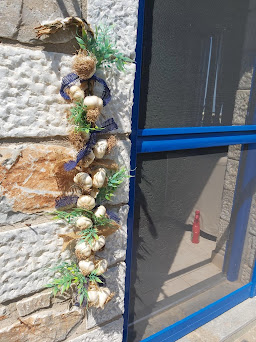









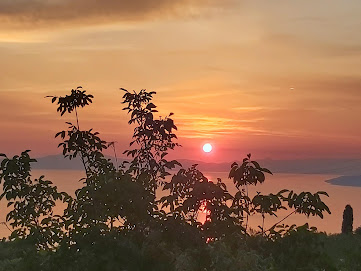

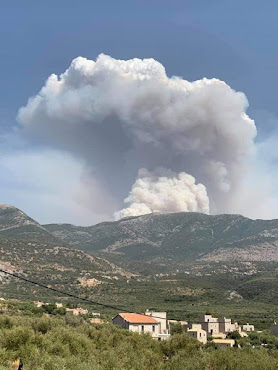




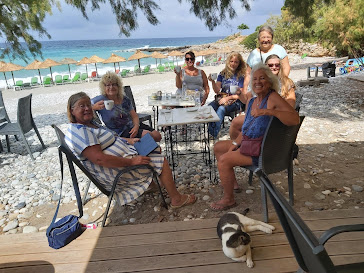


.png)



